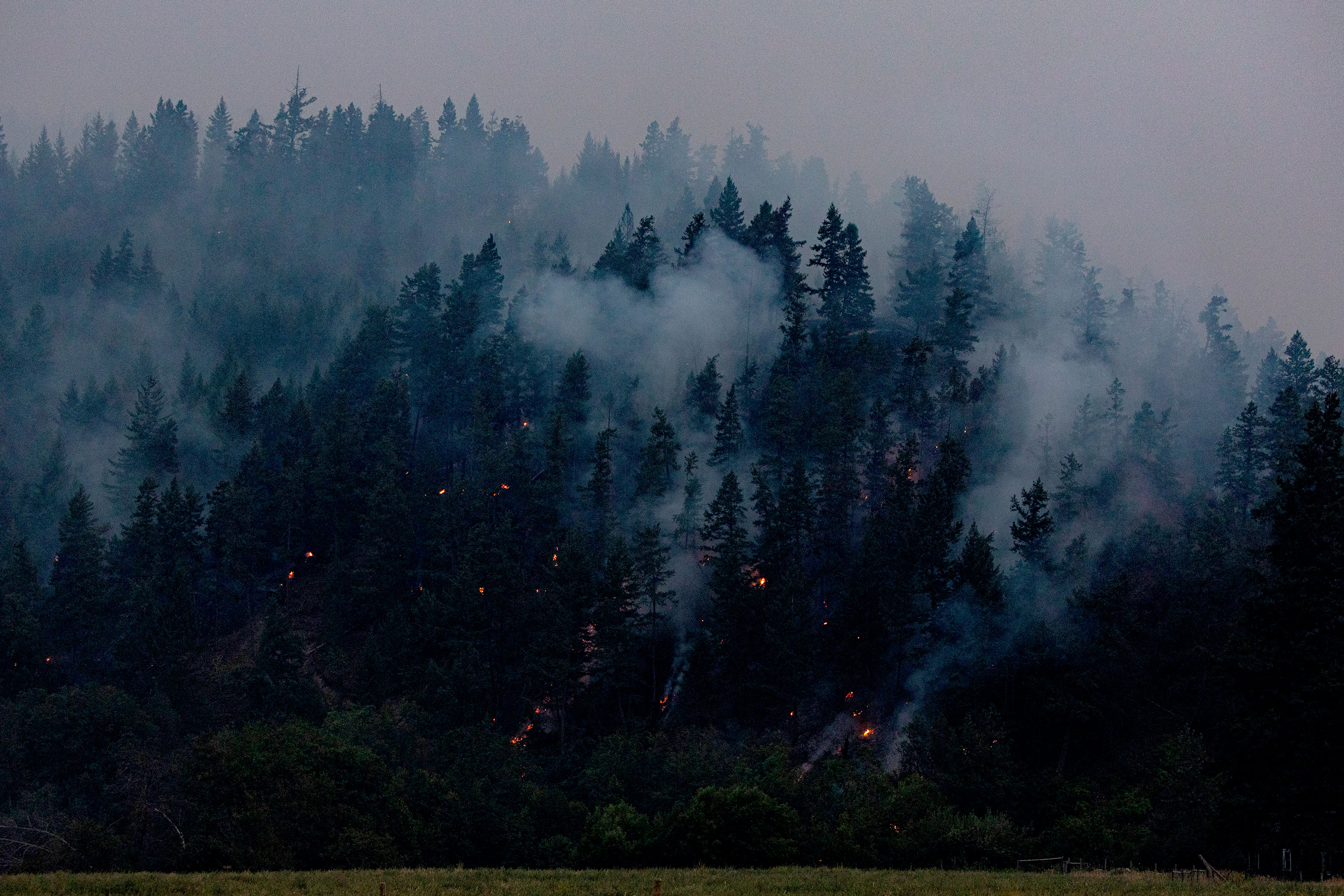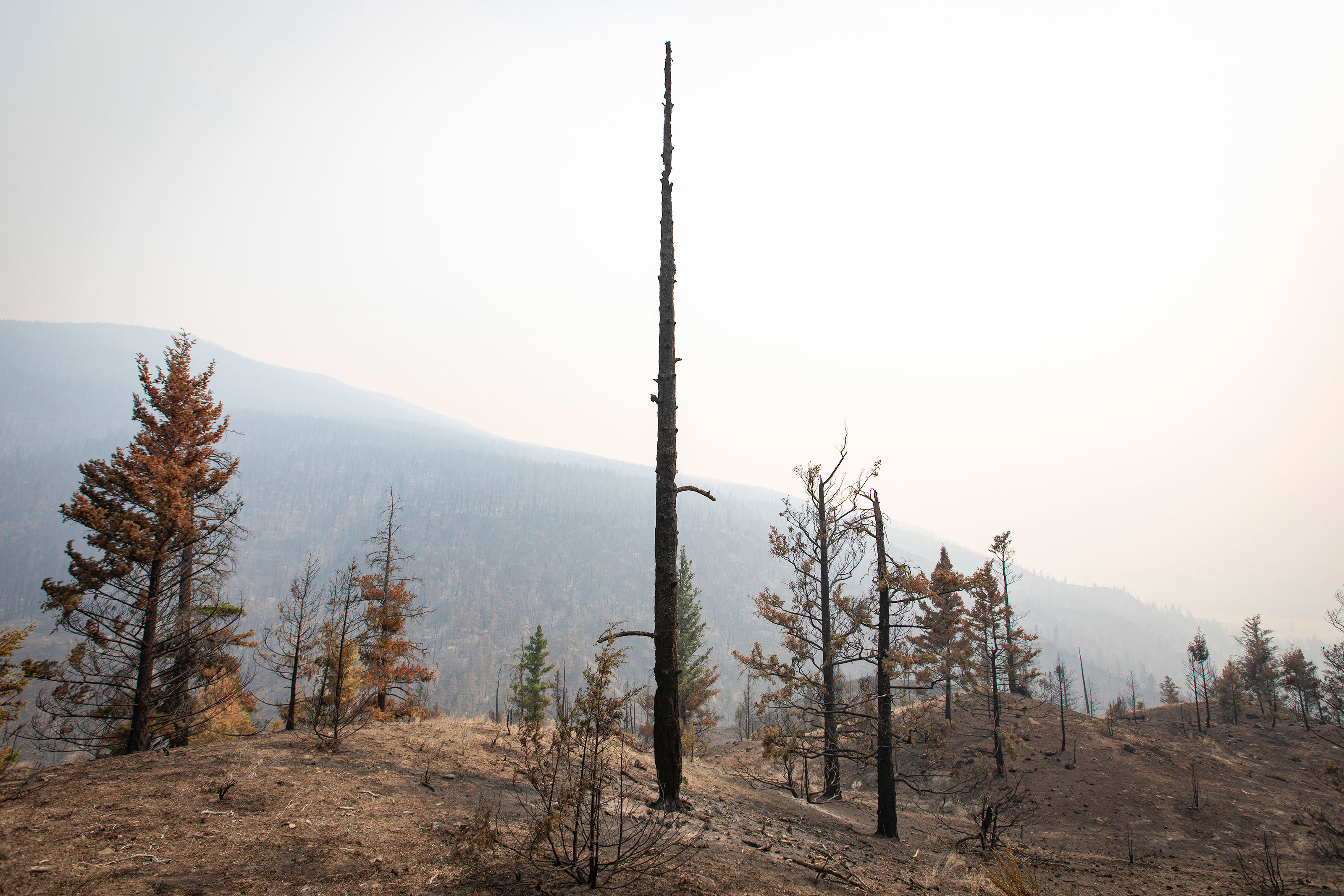KNOWING FIRE
Kizzy Draney spent July living in a tent. She was one of the 260 Skeetchestn Indian Band members ordered to evacuate their homes in the B.C. Interior from July 2 until Aug. 4 as the Sparks Lake wildfire burned out of control.
At an estimated 685 square kilometres, it’s currently the largest wildfire in British Columbia, a province that’s battling more than 200 blazes.
“It’s still sinking in. Not knowing when we can go home,” Draney said in an interview in July. “I’m scared of what it’s going to look like when I go back.”
She wasn’t just worried about her home, but the whole area, where she grew up hunting, fishing and riding horses.
“It’s going to be harder to do now that it’s burnt out.”
No structures on the band’s reserves have been lost, but thousands of hectares of the First Nation’s territory have been burned. The band’s leadership and staff say it didn’t have to be this way.
Like other First Nations in B.C. and across the country, Skeetchestn says its members could’ve helped fight the fire before it got so big. But their expertise wasn’t listened to right away and they weren’t quickly provided with the resources needed.

Their concerns echo a 2018 report on B.C.’s disaster management system, which found that poor collaboration with First Nations and a lack of support for their traditional methods of controlling wildfires — like prescribed burns — hampered the province’s response to natural disasters.

The report was commissioned after the record-setting wildfire season in 2017, which its authors said “may not have been an anomaly, but a strong indication of a new normal” due to climate change.
It recommended the B.C. government “establish Indigenous Peoples as true partners and leaders in emergency management by including First Nations from the beginning and at all levels of planning, decision-making and implementation.”
That’s not what happened with the Sparks Lake fire, said Skeetchestn Chief Darrel Draney.
Secwépemc Nation — which includes Skeetchestn — issued a state of emergency, calling the move “a drastic measure to ensure the continued safety of … vulnerable populations.”

Despite the evacuation order, some 75 community members returned to Skeetchestn to fight the fire and protect their land, Draney said.
Don Ignace is one of them, working as Skeetchestn’s incident commander for the Sparks Lake fire.
The command centre was set up in his own backyard, literally, where volunteers and firefighters dropped by for meals or to grab water or Gatorade, kept on ice. Volunteers cooked meals at the site, feeding between 50 and 75 people twice daily.
“We started responding to this on Day 1,” said Ignace. “We couldn’t wait for anybody.”
Forester Mike Anderson has worked for the band for 24 years. He’s non-Indigenous but grew up on a ranch on Skeetchestn territory. Anderson manages the growth and harvest of the community’s timber as head of Skeetchestn Natural Resources Corp.
The Sparks Lake fire has destroyed these valuable resources, he said, and the situation could have been avoided if First Nations’ expertise was put at the forefront of B.C.’s wildfire response.
“There’s hundreds of millions in timber that’s not replaceable. This forest could have been selectively logged. … Now we won’t log a stick off of here for 100 years,” Anderson said.

He also said millions of dollars could’ve been saved if the province had contracts signed and equipment ready for First Nations before the fire season.
“We have to bring First Nations knowledge into the equation on an equal basis with Western science … It’s what my chief calls walking on two legs.”
Dozens of band staff and members — including elders and firekeepers, who hold knowledge about wildfires that’s been passed down for generations — went out every day to deal with the fire. They held daily meetings with B.C. Wildfire Service personnel, telling the Ministry of Forests where to put their fire guards and watching for spot fires that came off the main blaze.
Skeetchestn had four or five two-person teams in pickup trucks equipped with pumps and hoses to put out these spot fires, Anderson said, so that fire wouldn’t get into the grasslands “and rip down through our community.”
Darrell Peters is a band member and head of Skeetchestn’s territorial patrol. His job is to take care of Skeetchestn territory, which is made up of four reserves and three ranches, according to the band’s website.
Peters’s great-grandmother took care of the same land in the early 20th century; his grandmother did the same after her.
His grandmother taught him how to do traditional burns in the spring and fall to clear brush that could fuel larger, lightning-caused wildfires in the hotter months.
“I know the land. I know the way the winds blow. I know fire,” he said.
Skeetchestn reached out to the province in the early days to provide information about the fire and where it was, Draney said, and to share the community’s knowledge of the land.
“It was a one-way conversation, with nothing coming back.”
Draney said provincial staff eventually started working with Skeetchestn and they established a working relationship. But Skeetchestn’s firefighting team lost about two days waiting.
A spokesperson for the B.C. Wildfire Service said the agency will review its response to the Sparks Lake fire, as it does after any event.

“Managing relationships in complex emergency situations is challenging, but extremely rewarding,” information officer Jean Strong said in an email to CBC News. “The B.C. Wildfire Service is proud of the relationship developed with the Skeetchestn Indian Band.”
Strong said Peters’s traditional knowledge was particularly helpful and helped the service funnel the fire into areas where prescribed burns had previously been done.
Draney said the B.C. government needs to reflect and take a look at one of its own laws: the Declaration On The Rights Of Indigenous Peoples Act, which recognizes that respect for Indigenous knowledge contributes to proper management of the environment.
“Joint decision-making on the land is where we want to go,” Draney said. “We want to be able to decide where we’re at on the land and to work together, stride for stride.”




